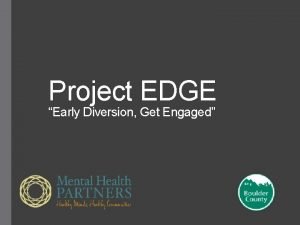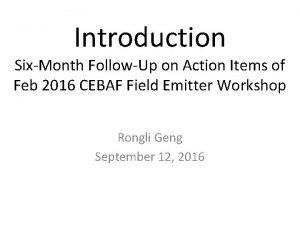Inspiring Leadership A Followup Study Examining the Impact

- Slides: 1

Inspiring Leadership: A Follow-up Study Examining the Impact of the Tarrytown Chief Residents Leadership Conference Bruce J Schwartz, MD; Andrea Weiss, MD; Michelle A Blackmore, Ph. D Albert Einstein College of Medicine, Montefiore Medical Center RESPONSES to Survey (0 -8 Likert Ratings) BACKGROUND • Leaders in psychiatry often begin in the role of chief resident, making it important that tenure as chief provides a successful learning experience inspiring personal and professional growth. • Experiential learning opportunities can directly prepare residents for the leadership demands in their role as chief, and in their future leadership endeavors. Chief Residents Leadership Conference, New York • For 39 years, the Tarrytown Chief Residents Leadership Conference, held by the Dept of Psychiatry at Albert Einstein College of Medicine, has provided one of the leading forums in advanced experiential training. • The 3 -day conference allows for a unique opportunity to gain direct experience with interpersonal and group processes and exploration of leadership and management abilities through group experiential exercises. • To examine the impact of this conference on preparing residents for future leadership positions, the authors examined self-report surveys from past attendees. During Leadership Conference Not - Minimally Willing/Helpful (0 -2) Moderately Willing/Helpful (3 -5) Very/Extremely Willing/Helpful (6 -8) 1. Willingness to engage in critical self-reflection 3% 22% 75 % 2. Willingness to engage in group activities (e. g. , sharing, responding) 3% 30% 67% 3. Willingess to address tension or conflict during group activities 14% 49% 37% 11% 35% 54% 4. Helpfulness of feedback received 5. Helpfulness of networking with other chief residents 12% * 1, 263 attendees were contacted; *541 attendees responded; *43% response rate §Mean Age: *40. 2 yrs old (range: 28 -65; SD=6. 19); Gender: *52% male §Mean Years Since Attended: * 7. 4 yrs (SD=3. 82) §Ethnicity/Race: *Caucasian: 65%, Asian/Pacific Islander: 16%, *Hispanic/Latino: 9%, *Black/African: 5%, *Other: 6% §Primary theoretical orientation of residency training program: *Psychodynamic: 45%, *Eclectic: 29%, *Biological: 11%, *Psychodynamic & Biological: 11%, *Cognitive-Behavioral: 5% §Current professional position/activities: *Institutional: 49% [*Admin: 59%, *Outpatient: 32%, *Inpatient: 16%, *Consultation-liaison: 14%, *Teaching (e. g. , residency/fellowship training): 68%] *Institutional & Private Practice: 31%, *Group Private Practice: 6%, *Solo Private Practice: 9%, *Free-Standing Clinic: 5% • Current position entailing leadership and/or administrative duties: 79% 28% Not - Minimally Improved (0 -2) Moderately/High Moderately Improved (3 -5) Very/Extremely Improved (6 -8) 1. Improved effectiveness as a leader 9% 46% 45% 2. Improved effectiveness as a supervisor 16% 60% 24% 7% 28% 64% 20% 34% 46% After Conference Changes 3. Improved self-awareness regarding personal behavior 60% 4. Improvement in general skills as a psychiatrist Not - Minimally Confident/Willing (0 -2) Before & After Conference Changes Moderately Confident/Willing (3 -4) High Moderately Confident/Willing (5) PARTICIPANTS in Present Study 1998 – 2011 Tarrytown Chief Residents Leadership Conference Attendees completed an anonymous, web-based survey on their conference experiences and its impact on their personal and professional development. RESPONSES to Survey (0 -8 Likert Ratings) Cont. Very - Extremely Confident/Willing (6 -8) Confidence in leadership abilities BEFORE Conference 18% Confidence in understanding group processes BEFORE Conference Willingness to address conflict w/ conflict resolution skills BEFORE Conference 6% *80% of attendees reported increased interest in pursuing leadership roles following the conference. Attendees value the conference: *90% felt the conference was an important and useful part of their residency training, even though 66% had already engaged in prior experiential and process work through their residency training programs. 44% *89% would recommend attending the Tarrytown Leadership Conference to other residents. 32% AFTER: DISCUSSION of Conference Impact AFTER: *80% rated the Tarrytown Conference as more helpful than other leadership conferences (36% of all attendees had engaged in prior leadership training). Bridging the gap: The advanced experiential learning opportunities central to the Tarrytown Leadership Conference help bridge the gap between training and practice. Attendees reported increased confidence and ability in utilizing skills necessary for effective leadership, as well as enhanced personal and professional growth. CONTACTS Bruce J Schwartz, MD: bschwart@montefiore. org; Andrea Weiss, MD: aweiss@montefiore. org

